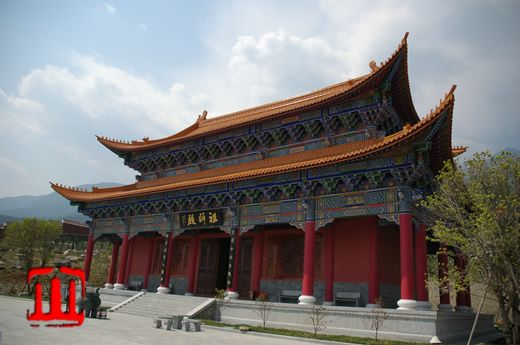All of Patriarchs
2020-01-22 00:49 | Hits: 1209
From: Three Pagodas of Chongsheng Temple Author: Office
2020-01-22 00:49 | Hits: 1209
From: Three Pagodas of Chongsheng Temple Author: Office

The six Patriarchs of Zen
were enshrined in the Hall of Patriarchs. Zen is one of the Buddhist
sects with the most profound and widest influence as well as the most
distinct national features. The core of the thought of Zen is the
so-called “spreading the Buddhism by heart” which means it aims to dig
out the intrinsic Buddha nature, but it will not spread itself outside
of the believers and nothing would be written down. It needs people to
comprehend themselves.
Dharma: one of the 28 patriarchs of the Western Paradise and the initial patriarch of the east. He came from South India and come to China during the reign of Emperor Liangwudi. He first arrived in Nanjing, then continued to go to the north China along the Yangtze River (with a reed). Later he spent nine years in interpreting the Buddhist thought in Shaolin Temple in the Songshan Mountain alone. The Zen idea then referred to the way in which Dharma was enlightened and abandoned the early thought.
Huike: originally named
Shengguang. Because of his determination to learn Zen from Dharma by
standing in the chilly snowy day and cutting off his own arm, Dharma
accepted him as his follower and changed his name to “Huike”. Later
Dharma even agreed to let him take over his mantle.
Later Sencan’s mantle fell on Daoxin and Daoxin’s fell on Hongren.
Hongren: one of the
disciples of Daoxin since he was young. Later he set up Dongshan Temple
in Fengmaoshan Mountain in Shandong Province and spread Zen for 40
years. His insect was called “Dongshan Means to Zen”. Hongren had many
followers. The most outstanding two were Shenxiu and Huineng. The two
initiated respectively “north Jian” and “South Dun” and were therefore
called by people with respect as “south Neng and north Xiu”.
Huineng: born in Xinzhou in
the south of the Five Ridges. He lost his father when he was very young.
Due to the poverty, he had to raise his mother by selling the firewood.
One day he heard Diamond Sutra recited by others and was
enlightened. Then he visited Hongren in Fengmaoshan Mountain. You may
have heard a funny story about their meeting, from which we can find
although Huineng was almost illiterate at that time, he was brighter
than most of the people. When Hongren saw huineng, he asked him, “Who
are you and what do you want?”Huineng answered, “I am from the south of
the five ridges and I came here to learn from you about the Buddhist
thoughts.” Hongren tehn asked,” you are from the south of the Five
Ridges and belong to the ignorant minority, how can you learn the
Buddhist thoughts?” Huineng answered with wit, “people can be divided by
their regions, but Buddhism is the same everywhere.” Huiren then asked
him to processing rice with hammer. After a while, Hongren gathered his
disciples and asked every one of them to compose a Buddhist verse. He
would decide which one could take over his mantle. Shenxiu said, “The
body is a linden tree, and the heart is as clear as a bright mirror. I
will always clean them up to avoid any dusts fall on them.” Hongren
thought it unsatisfactory. Huineng then said, “There is no linden tree
or a bright mirror. There is no nothing at all. So where can the dusts
fall onto?” Hongren thought he was enough intelligent so he gave his
mantle to hum at night. After that, Huineng hurried back to the south in
the midnight and lived in seclusion for a while. Later he initiated
Nanhui Temple and spread the Buddhist thoughts for 30 years. Another
story is worth mentioning. Once Huineng had a discussion with another
monk streamer, he said, “It’s not the wind which is moving, nor the
streamer. It is your mind that is moving.”(It is where the saying “you
will not feel the discomfort the hot weather brings if only you calm
yourself down.”)
All of the six patriarchs of
Zen are carved into 6m-high sitting statues. The figures without being
gilded thus display a more profound religious atmosphere with wisdom and
intelligence.